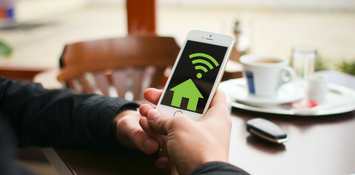You are viewing our site as an Agent, Switch Your View:
Agent | Broker Reset Filters to Default Back to ListHow The 'Internet of Things' Affects Real Estate
January 23 2017
 Growing interest in Wi-Fi connected gadgets inspired us to write this article about Internet of Things (IoT). So today we cover IoT: what it is, how it affects real estate, and what to look for in the future.
Growing interest in Wi-Fi connected gadgets inspired us to write this article about Internet of Things (IoT). So today we cover IoT: what it is, how it affects real estate, and what to look for in the future.
What is the Internet of Things (IoT)?
The English Oxford dictionary defines the Internet of Things (IoT) as "the interconnection via the Internet of computing devices embedded in everyday objects, enabling them to send and receive data."
For example, lights that can connect to your smartphone via internet so that you can turn them on or off wherever you are, even if not at home, wearable devices to track your sleeping habits, or self-driving cars. These everyday objects with internet connectivity aim to provide convenience and efficiency to the user by sensing, tracking and transmitting data. And because the growth in the industry has made such devices very affordable, they are proliferating. All these devices, regardless of who makes them, are categorized into the IoT concept.
How It Affects Real Estate
IoT gadgets for the home lead to smart homes. Did you get a Wemo Switch this year as a holiday gift? Or perhaps an Alexa-controlled Echo speaker? If you did, you are probably on your way to transitioning your home to a smart home. Smart homes are homes "equipped with network-connected products." Perhaps you already started noticing clients who are more excited when they tour properties with "smart home technology." In these homes, devices communicate with each other – from the alarm clock to smart thermostats, fire alarms and security cameras.
Yet, while individuals look for smart home technology for convenience, countries are looking to design entire smart cities for efficiency. Each country has its own set of laws, policies, resources and interests about how to go about this; nevertheless, companies are working with governments worldwide to implement technology for smart cities. Here are a few examples:
-
In the USA, $65 million in grants were announced on October 13, 2016, to support advanced technology transportation projects. Cities receiving funding include Pittsburgh, Denver, Los Angeles, and Portland, among others, per the U.S. Department of Transportation.
-
In Canada, city planners are actively working with Miovision to improve traffic management. And beyond that, the Canadian National Research Council is looking ahead by trying "to understand and plan how we must re-engineer our urban infrastructure such as transportation, energy, and water and waste management."
-
In Australia, a $50 million Smart Cities and Suburbs Program is in the works, and as of December 2016, they were seeking public input to their draft guidelines.
-
It doesn't end there. Spain, Singapore, India, and many other countries are also developing their own smart cities. Among the motivating factors, countries are looking to use "technology to improve livability, workability, and sustainability."
What to Look for in the Future
The "Smart home sector could be worth hundreds of billions," according to Forbes, and companies such as Alphabet (Google's parent company), Amazon and many others are vying to get a piece of that pie. But few companies are seeking to build platforms and ecosystems. Most are looking to deliver specific products. You may have noticed that there are already several thousand products in the market – appliances, door lock openers, cameras, thermostats, etc. – created by diverse companies. And while they do bring a level of modern convenience, they also bring a level of risk. Most notably, saw this on October 21, 2016, when cyber-criminals mounted a hack of these IoT devices to bring down a large portion of the internet.
But just because there admittedly is risk associated, does not mean that the industry does not continue to move forward and push the limits of what can be done. Indeed, a Forbes article states that "the relationship will be between people-people, people-things, and things-things" is changing. How are you adapting?
To view the original article, visit the Tech Helpline blog.









